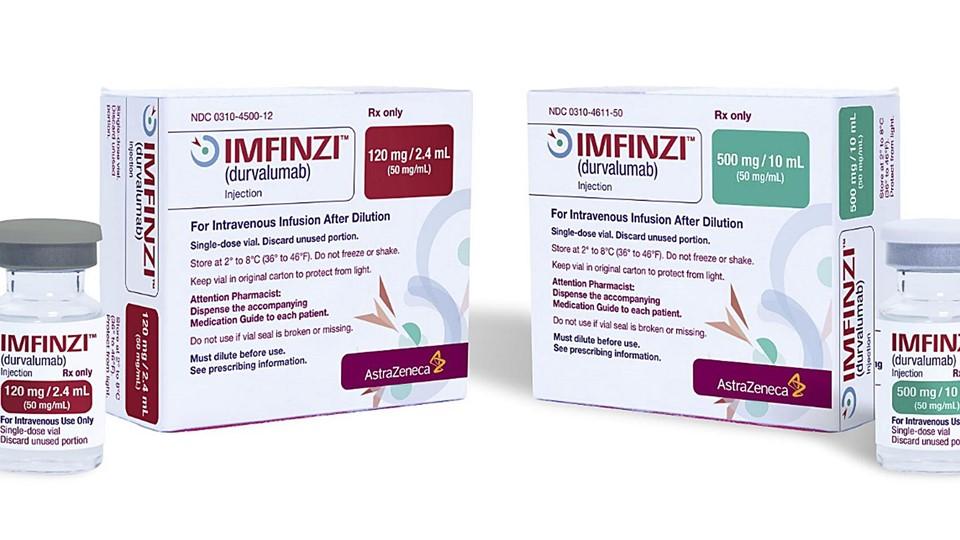Imfinzi fails lung cancer trial, but scores in bladder cancer

AstraZeneca’s hopes of positioning its PD-L1 inhibitor Imfinzi as a post-surgery therapy for people with earlier-stage lung cancer have taken a knock, although it performed well in a bladder cancer study.
Top-line results from the phase 3 ADJUVANT BR.31 study showed that giving Imfinzi (durvalumab) as adjuvant therapy for stage IB-IIIA non-small cell lung cancer (NSCLC) was no better than placebo at extending disease-free survival (DFS).
The trial enrolled patients with NSCLC that had PD-L1 expression on 25% or more cells whose tumours had been completely removed with surgery.
Imfinzi is already approved for unresectable, stage III NSCLC in patients whose disease has not progressed after chemoradiotherapy (CRT), based on the results of the PACIFIC trial, carving out a niche for itself away from the dominance of MSD’s Keytruda (pembrolizumab) in metastatic disease.
AZ has struggled to extend the label of Imfinzi beyond that in NSCLC, other than a 2022 approval for the drug in combination with its CTLA4 inhibitor Imjudo (tremelimumab) for patients with metastatic (stage IV) disease. Last year, for example, the results of the PACIFIC-2 study were unable to show that adding the drug to CRT improved on CRT alone in unresectable, stage III NSCLC.
Sales momentum for the drug is still good, however, fuelled by a lengthening list of indications in other cancers, including most recently primary advanced or recurrent endometrial cancer that is mismatch repair deficient (dMMR). In the first quarter of this year, Imfinzi grew more than 50% to $900 million.
“We are disappointed in the ADJUVANT BR.31 results,” said AZ’s head of oncology R&D, Susan Galbraith.
“Imfinzi has helped change the treatment landscape and achieved multiple positive phase 3 trials for patients with earlier stages of lung cancer,” she added. “We are committed to addressing the remaining unmet need in lung cancer through our broad development programme.”
AZ is running several other studies in the hope of extending the labelling for the PD-L1 inhibitor in NSCLC, including medically inoperable or unresected stage I-II NSCLC in PACIFIC-4 and unresectable, stage III NSCLC in PACIFIC-5, -8, and -9.
There are plenty of options already available for perioperative treatment of early-stage NSCLC. Keytruda is already approved for adjuvant treatment after resection and platinum-based chemotherapy for stage IB-IIIA NSCLC, as is Roche’s Tecentriq (atezolizumab), with a similar indication, but in tumours that express PD-L1 in 1% of cells or more.
MSD, meanwhile, also has a green light for Keytruda as perioperative therapy for patients with stage II, IIIA, or IIIB NSCLC tumours that are 4 cm or larger or affecting lymph nodes, and treatable with surgical resection, while Bristol-Myers Squibb has the green light for pre-surgical use of Opdivo (nivolumab) and recently filed for approval as a perioperative option in resectable stage IIA to IIIB NSCLC cases.
Bladder cancer hopes back on track
There was better news for Imfinzi this week in the NIAGARA study, which gives AZ a chance to return to the bladder cancer category with the drug three years after pulling out.
NIAGARA compared Imfinzi plus chemo to chemo alone in muscle-invasive bladder cancer (MIBC) patients scheduled for a cystectomy to remove the bladder. According to the top-line results, there was a statistically significant improvement in event-free survival (EFS) and overall survival (OS) with AZ's drug, with no impact on the ability to complete the surgery and manageable side effects.
The company said it plans to file the data with regulators, stating it has the potential to "transform the standard of care" for patients with MIBC. Imfinzi claimed an accelerated approval from the FDA in 2017 for advanced-stage bladder cancer, but that was withdrawn in 2021 after it failed a confirmatory trial.
Imfinzi is being tested across early- and late-stage bladder cancer in various treatment combinations, including in non-muscle invasive disease in the POTOMAC study, MIBC patients who are cisplatin-ineligible or refusing cisplatin in VOLGA, and locally advanced or metastatic disease in NILE.












